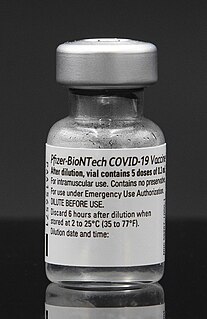In biology, immunity is the capability of multicellular organisms to resist harmful microorganisms. Immunity involves both specific and nonspecific components. The nonspecific components act as barriers or eliminators of a wide range of pathogens irrespective of their antigenic make-up. Other components of the immune system adapt themselves to each new disease encountered and can generate pathogen-specific immunity.
The Vaccine Adverse Event Reporting System (VAERS) is a United States program for vaccine safety, co-managed by the U.S. Centers for Disease Control and Prevention (CDC) and the Food and Drug Administration (FDA). VAERS is a postmarketing surveillance program, collecting information about adverse events that occur after administration of vaccines to ascertain whether the risk–benefit ratio is high enough to justify continued use of any particular vaccine.

Sonic Death is a live album by American rock band Sonic Youth. It was released in 1984 on cassette tape by the Ecstatic Peace! record label.

Paul Allan Offit is an American pediatrician specializing in infectious diseases, vaccines, immunology, and virology. He is the co-inventor of a rotavirus vaccine. Offit is the Maurice R. Hilleman Professor of Vaccinology, professor of pediatrics at the Perelman School of Medicine at the University of Pennsylvania, former chief of the Division of Infectious Diseases (1992–2014), and the director of the Vaccine Education Center at The Children's Hospital of Philadelphia. He has been a member of the Centers for Disease Control (CDC) Advisory Committee on Immunization Practices. Offit is a board member of Every Child By Two and a Founding Board Member of the Autism Science Foundation (ASF).

Peter Parada is an American musician who has been a member of several bands. Parada's drumming career began in 1995 when he joined L.A. band World In Pain on a recommendation from future Korn drummer Ray Luzier and then Steel Prophet in 1996 with whom he recorded one album a year later. Subsequently he joined Face to Face, Saves the Day and The Offspring, where he was a member from 2007 to 2021 and served as the band's second longest-serving drummer, behind Ron Welty. Parada was also associated with the metal band Engine and Rob Halford's solo project Halford, and briefly played drums in the punk band Alkaline Trio.
Harry Crews was an American, short-lived no wave-influenced hardcore punk and crossover thrash supergroup, made up of Lydia Lunch (guitar), Kim Gordon (bass), and Sadie Mae (drums). The band was only musically active in 1988, and only officially produced and released one album, Naked in Garden Hills. The album was released in 1989 and was a compilation of live recordings played at clubs in London, England, and Austria. Shortly after the release of the album the band split up, due to their involvement in other bands and projects. The band's name was taken after the author of the same name, hence the album's title being taken from a novel by Crews. The majority of the songs were also named after Crews' various novels. They also covered "(She's in A) Bad Mood", and "Orphans"

Mady Hornig is an American psychiatrist and an associate professor of epidemiology at Columbia University's Mailman School of Public Health. A physician-scientist, her research involves clinical, epidemiological, and animal model research on autism and related neurodevelopmental conditions. She directs the clinical core of an international investigation of the role of Borna disease virus in human mental illness and participates as a key investigator for the Autism Birth Cohort (ABC) project, a large prospective epidemiological study, based in Norway, that is identifying how genes and timing interact with environmental agents preceding the onset of autism spectrum diagnoses. In 2006, she was appointed as Guest Professor at the School of Basic Medical Science of Beijing University in Beijing, China.

Autism's False Prophets: Bad Science, Risky Medicine, and the Search for a Cure is a 2008 book by Paul Offit, a vaccine expert and chief of infectious diseases at Children's Hospital of Philadelphia. The book focuses on the controversy surrounding the now discredited link between vaccines and autism. The current scientific consensus is that no convincing scientific evidence supports these claims, and a 2011 journal article described the vaccine-autism connection as "the most damaging medical hoax of the last 100 years".

The Vaccines are an English indie rock band, formed in West London in 2010 by Justin Hayward-Young, Freddie Cowan, Árni Árnason and Pete Robertson.
Kauan is an atmospheric doom metal/post-rock band from Chelyabinsk, Russia formed in 2005.

The Bad Livers were an American band from Austin, Texas, United States, whose inventive musical style defied attempts to categorize them according to existing genres, though their influences included bluegrass, folk, punk, and other musical styles. The original lineup, formed in 1990, included Danny Barnes on banjo, guitar and resonator guitar, Mark Rubin on upright bass and tuba, and Ralph White III on fiddle and accordion. Barnes composed the majority of the group's original songs. When White left the group at the end of 1996, he was briefly replaced by Bob Grant on mandolin and guitar. Barnes and Rubin then continued to perform and record as a duo until unofficially dissolving the band in 2000. The band has neither toured nor recorded since then, but Barnes and Rubin have played a few live shows with Grant in 2008, 2009, and 2014.

"Electricland" is a song by English hard rock supergroup Bad Company. The song was released as the only single from the band's sixth studio album Rough Diamonds. It is the last single released by the band to feature their original line-up, as well as being the last to feature lead singer Paul Rodgers until 1999's "Hey Hey".

All Star Road Band is a live album by American pianist, composer and bandleader Duke Ellington recorded at Sunset Ballroom in Carrolltown, Pennsylvania for radio broadcast and first released as a double LP on Bob Thiele's Doctor Jazz label in 1983. The album was rereleased on CD under the title All Star Road Band Volume One.
The Lancet MMR autism fraud centred on the publication in February 1998 of a fraudulent research paper titled "Ileal-lymphoid-nodular hyperplasia, non-specific colitis, and pervasive developmental disorder in children" in The Lancet. The paper, authored by Andrew Wakefield and listing twelve coauthors, falsely claimed to link the MMR vaccine to colitis and autism. The fraud was exposed in a lengthy Sunday Times investigation by reporter Brian Deer, resulting in the paper's retraction in February 2010 and Wakefield being struck off the UK medical register three months later.

A COVID‑19 vaccine is a vaccine intended to provide acquired immunity against severe acute respiratory syndrome coronavirus 2 (SARS‑CoV‑2), the virus that causes coronavirus disease 2019 (COVID‑19). Prior to the COVID‑19 pandemic, an established body of knowledge existed about the structure and function of coronaviruses causing diseases like severe acute respiratory syndrome (SARS) and Middle East respiratory syndrome (MERS). This knowledge accelerated the development of various vaccine technologies during early 2020. The initial focus of SARS-CoV-2 vaccines was on preventing symptomatic, often severe illness. On 10 January 2020, the SARS-CoV-2 genetic sequence data was shared through GISAID, and by 19 March, the global pharmaceutical industry announced a major commitment to address COVID-19. The COVID‑19 vaccines are widely credited for their role in reducing the spread, severity, and death caused by COVID-19.

The Moderna COVID‑19 vaccine, codenamed mRNA-1273 and sold under the brand name Spikevax, is a COVID-19 vaccine developed by Moderna, the United States National Institute of Allergy and Infectious Diseases (NIAID) and the Biomedical Advanced Research and Development Authority (BARDA). It is authorized for use in people aged twelve years and older in some jurisdictions and for people eighteen years and older in other jurisdictions to provide protection against COVID-19 which is caused by infection by the SARS-CoV-2 virus. It is designed to be administered as two 0.5 mL doses given by intramuscular injection at an interval of 29 days apart.

The Oxford–AstraZeneca COVID-19 vaccine, codenamed AZD1222, and sold under the brand names Covishield and Vaxzevria among others, is a viral vector vaccine for prevention of COVID-19. Developed by Oxford University and AstraZeneca, it is given by intramuscular injection, using as a vector the modified chimpanzee adenovirus ChAdOx1. Studies carried out in 2020 showed that the efficacy of the vaccine is 76.0% at preventing symptomatic COVID-19 beginning at 22 days following the first dose and 81.3% after the second dose. A study in Scotland found that, for symptomatic COVID-19 infection after the second dose, the vaccine is 81% effective against the Alpha variant, and 61% against the Delta variant.

The Pfizer–BioNTech COVID-19 vaccine, sold under the brand name Comirnaty, is an mRNA-based COVID-19 vaccine developed by the German biotechnology company BioNTech. It is authorized for use in people aged twelve years and older in some jurisdictions and for people sixteen years and older in other jurisdictions, to provide protection against COVID-19, caused by infection with the SARS-CoV-2 virus. For its development BioNTech collaborated with Pfizer, an American company, for support with clinical trials, logistics, and manufacturing. The vaccine is given by intramuscular injection. It is composed of nucleoside-modified mRNA (modRNA) encoding a mutated form of the full-length spike protein of SARS-CoV-2, which is encapsulated in lipid nanoparticles. Initial advice indicated that vaccination required two doses given 21 days apart, but the interval was later extended to up to 42 days in the US, and up to four months in Canada.
The COVID-19 vaccination program in the Philippines is an ongoing mass immunization campaign against severe acute respiratory syndrome coronavirus 2 (SARS-CoV-2), the virus that causes coronavirus disease 2019 (COVID-19), in response to the ongoing pandemic in the country.













